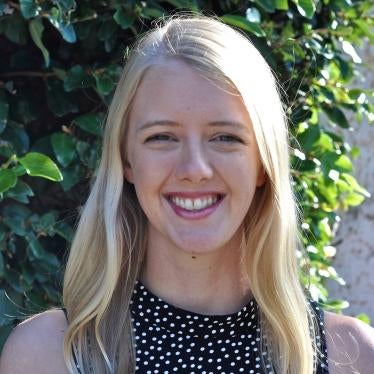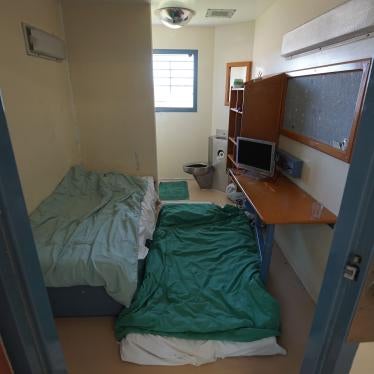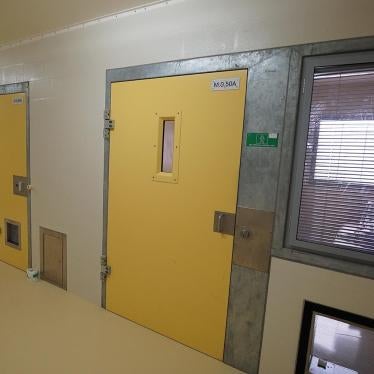The police killing of George Floyd in the United States has sparked renewed calls and demonstrations in Australia to address Aboriginal deaths in custody. My thoughts have been with the family of Mr Jackamarra (whose full name isn’t used for cultural reasons), an Aboriginal man who died in Broome prison in Western Australia in December 2015.
When Mr Jackamarra left for a routine court appearance, his family never suspected that he wouldn’t return. “That morning when he went to court, he sang out ‘Mum, put the chicken out, I’ll come back and cook you supper,’” his mother, Georgette, told us. “But he never came back.”
The 36-year-old Mr Jackamarra took his life just four hours after appearing in court on charges related to a bailable arson offence.
Nearly three decades since the Royal Commission into Aboriginal deaths in custody, Indigenous Australians still die in prison in preventable circumstances. The Guardian Australia found at least 432 Indigenous people have died in custody since the royal commission ended in 1991, with more than 40 percent of those cases involving mental health conditions or cognitive disabilities.
When I met the Jackamarra family in Broome last year, they showed me his photos – days at the beach with family, striking a pose as a teenager, and holding a baby. I find it hard to reconcile these happy snapshots with how his life ended.
Mr Jackamarra had three children and, his family said, he was trying to turn his life around. He was taking a hospitality course at TAFE and loved cooking. His godmother missed the way he would burst out laughing: “He loved life, he loved his family, and he loved his mum.”
Mr Jackamarra had a mental health condition and had been on daily medication for many years, including during his time in custody. He was in and out of prison for much of his life – he first entered a juvenile detention center in Perth for breaking and entering. He was just 11 years old, a year older than Australia’s age of criminal responsibility.
When police picked him up during his childhood, his mother would ask to be locked up with him to play cards until his anxiety reduced.
When he left for court in 2015, Mr Jackamarra didn’t expect to return to prison. But a relative did not arrive in time to sign his bail documents. While he waited in the court’s holding cell, Mr Jackamarra became increasingly distressed and began banging his head against the wall. He also asked for his medication. The 2019 coronial inquest into his death found that SERCO officers didn’t follow documentation procedures when they moved him to Broome prison. While they noted that he was in psychological distress in an internal reporting system, they didn’t tell prison staff that he had been hitting his head and asking for medication.
Although Mr Jackamarra had been in Broome prison more than 20 times and his mental health history was well known to the prison authorities, he was not identified as being at risk of self-harm.
Two and a half hours after he arrived, he was found hanging in the shower block.
The coronial inquest recommended improved information sharing between the prison system and medical services, and said that mental health staff should assess prisoners with mental health conditions or past self-harm attempts when they arrive.
In early April, a Victorian coroner called for dramatic changes to how people with mental health conditions are treated in prison. The litany of institutional failures documented in the coroner’s report was disturbing, but I was not surprised. Many details in the case of Darren Brandon, a Melbourne man who hanged himself in prison in 2018, closely echoed those described to me by the family of Mr Jackamarra.
The inquest into Darren Brandon’s death made it clear that lessons have not been learned since Mr Jackamarra died, five years ago on the opposite side of the country. A motorcycle accident in 2003 had left Mr. Brandon with a severe brain injury. The coroner ruled that his death was preventable – and found that Victoria Police Custodial Health Service failed to pass on critical information about his disability and history of self-harm when he was transferred to prison.
Prisons across Australia urgently need better systems to screen prisoners with disabilities and ensure that they get support and mental health services. The Royal Commission into Violence, Abuse, Neglect and Exploitation of People with Disability should closely examine deaths in custody to understand why almost 30 years after a previous Royal Commission into Aboriginal deaths in custody, we are still seeing many preventable deaths in Australian prisons.










